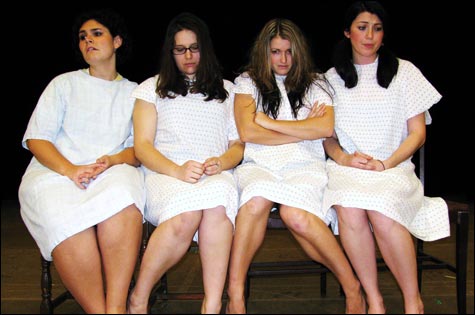
A SPAN OF BODY TYPES: Luzitano, Hawkridge, Marchetti, and Hurley in Massive Woman. |
As issue theater goes, The Most Massive Woman Wins isn't strident, just relentless. The current production by the newly formed LaVoce Theatre (through January 30) maintains a tight emotional focus on its subject: female weight obsession and its dire consequences.
At less than 40 minutes, this play by Madeleine George doesn't overstay its welcome. Considering that it's arguing at us all that time, that's surprising. And despite the humorous tone of its title, this is a serious essay-in-action rather than the parade of easy ironies you might expect.
There's no disputing the issue: If a man is overweight, he might be considered prosperous. But when have you ever seen a woman patting her paunch in pride, unless she's pregnant?
The tone is set with the first line of the pre-show song, sung by the director, Julie Rackauskas, with her own guitar accompaniment. "Locked Up" begins: "You've never had me at hello," clueing in any Renee Zellwegers in the audience against being charmed by any smooth-talking Tom Cruises.
A row of four chairs is lined up in front of us, as though the actors will be taking turns stepping up to a lectern. But Rackauskas is well aware of the disadvantages of such a talky play and keeps things moving, at every opportunity physicalizing the feelings being discussed. At one point, for example, someone expressing hopelessness is backed up by the others, seated, dropping their heads between their knees in abject despair.
Playwright George helps things out when one actor is speaking by having the others act out or comment on the recollection being described: "She's too fat for jump rope!" three children shrilly exclaim when one character is detailing childhood embarrassments. The four young women represent a span of body types. They portray Cel (Jackie Marchetti), Rennie (Kaitlyn Hurley), Carly (Mary Beth Luzitano), and Sabine (Kira Hawkridge).
Early on, Carly mimics her boyfriend saying that "my butt and my gut were the parts he paid for." He tips a beer bottle to his lips and leaves a liposuction ad and a signed blank check for her to find. Fortunately, such a trite target doesn't pop up again. Obvious concerns need inobvious examples, and they are more frequent. More instructive is a restaurant manager who says he's seeking a certain aesthetic that rules out hiring "a woman of your stature" as a waitress. "No offense," he adds.
The usual pattern that we see is the one-two punch of social or parental conditioning followed up by guilt or criticism. The four actors sing the children's refrain "Little baby Sally, you're not sick — all you need is a peppermint stick," as an example of how food is used for comfort early on. Rennie recalls having "a Slimfast thrust into my hand at 12 years old," a mixed message if ever there was one. She also tells us about hiding in the kitchen during one of her mother's weddings, devouring an entire multi-tiered wedding cake in anger.
We are being inundated with media images that reinforce socially determined standards of femininity, a lecturer reminds us at one point. The response isn't amen but rather reprimands. "You are responsible for your own behavior," one of the women is told. "You are guilty!"
A few of these points, made and remade, can go a long way, then collective dûjà vu descends. Preaching to the choir can create disbelievers after the first few hours. This production is accomplished skillfully enough that there's not a similar danger. Though not a single dismal point made here comes as news, the process of communal commiseration makes the experience worthwhile.
LaVoce artistic director Patricia Hawkridge spoke briefly to the audience after opening night, in what will be a question-and-answer period following performances at Salve Regina University's Antone Center on January 23 and the URI Providence Campus' Paff Auditorium on January 30 at 7:30 pm (admission is $10). "Oh, I forgot to tell you that this wasn't a comedy," she joked. Yes, The Most Massive Woman Wins is serious business. But that's not to say feminist concerns can't be brought to our attention in good humor. Once anger subsides, that's been a source of female resilience for ages.